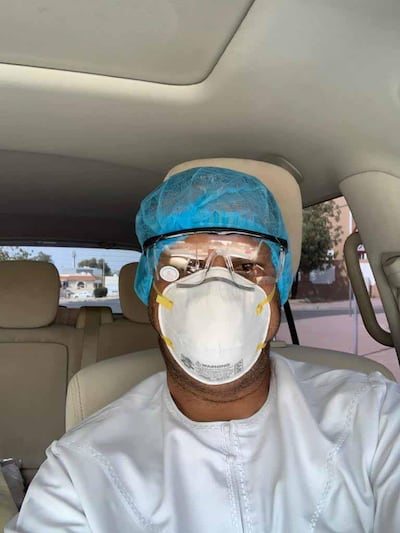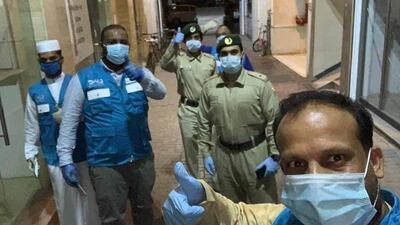Community champion Naseer Vatanappally was fuelled by a desire to support his family when he moved to the UAE as a teenager to take up a job as a petrol attendant.
More than two decades of hard work have helped him establish a business and invest time and resources into helping others by taking the sickly to health centres and volunteering to take food to thousands of workers who have lost jobs.
Now it is his adopted country that comes first as he plays a crucial role in the fight against Covid-19.
As an 18-year-old, he earned Dh800 in 1997 to cover rent and send funds to support his family in Kerala, southern India.
He did not have 48,000 rupees (Dh2,300) for a visit visa and air ticket so gave an agent a security cheque with the promise that he would clear the debt.
“I didn’t know English, Arabic or Hindi, I learnt all languages here,” said Mr Vatanappally who is fluent in his native Malayalam language.
“My family wanted me to study in India but my father was injured and there was not enough money. I heard of Dubai and made up my mind I wanted to work here.”
Mr Vatanappally took a few years saving money from a part-time job delivering newspapers across Dubai at 2am and saving tips earned at the petrol station.
He then found work as a public relations officer handling government documentation and later set up his own typing centre and visa business.
The 41-year-old soon realised people needed assistance when they were ill in hospital or to secure official clearances to repatriate bodies of expatriates who died in the UAE.
“Everyone knows Naseer,” said Jinny Abraham, a nurse in a Dubai hospital.
“When there is an Indian, Bangladeshi or Pakistani worker in hospital and we need to reach their family, people call him and he comes to help.”
His family has given up on him showing up for special occasions because his phone constantly buzzes with messages and calls.
“The meaning of my name is helper so I support people,” said the father of three, also a social worker with the Indian consulate
“I never switch off my mobile because it could be an emergency case. I don’t mind because these men work in grocery shops and cafeterias and really don’t have much money.”

When the coronavirus outbreak began in the UAE, Mr Vatanappally's links with the community made him a natural choice for workers many of whom live in densely populated neighbourhoods.
“Men would call and tell me they had high fever for days and would send me their location,” he said.
“I would tell them to come to their balcony, get all the details and pass it on to the authorities. Then doctors took these people to hospital.”
He signed up as a volunteer with the Watani Al Emarat Foundation and worked with health, police and security officials to pinpoint apartments where people had contracted the virus.
Mr Vatanappally and a band of volunteers delivered thousands of meals daily when people in Al Ras and Naif areas were asked not to leave their homes to slow the spread of the virus.
He contracted a mild strain of Covid-19 in early April and was in hospital for two weeks.
“When I was working in the Naif area, I didn’t know what date or day it was because we were getting so many calls,” he said.
“I thought my voice was bad because there was so much work but the doctors told me I must rest because of covid.”
By end-April, when he recovered, Mr Vatanappally was back on his rounds helping workers in need.

“Now I’m more careful about putting on gloves, mask when I work because I don’t know who could be positive,” he said.
He treasures a gift of chocolates, flowers and a watch presented to him by Dubai state security.
“What I admire is the UAE does not look at which country you are from,” he said.
“The security and police take food to people from all countries and doctors treat every patient.”
He often goes back to an Eppco petrol station in Mankhool, Dubai where he once worked and chats with attendants.
Mr Vatanappally believes giving back to the country that helped him earn a livelihood is his duty.
“I tell them nobody comes here rich. I came here as a worker earning only Dh800 but you can have a good life if you work hard,” he said.
“My wife understands if somebody calls I will answer, that comes first and second is family because the UAE is my country."


